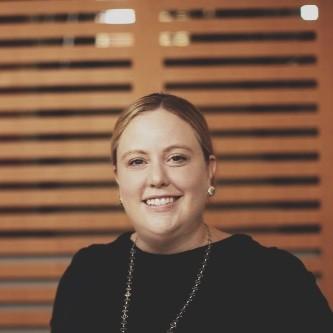Meet Kate Calder
As chair of the Department of Statistics and Data Sciences in the School of Natural Sciences, Catherine (Kate) Calder oversees an area of rapid change and growth. She thrives on the challenges.
The young department was formed in 2014, making it the newest in the School of Natural Sciences. In 2019, Calder was hired to become chair after earning her doctorate in Statistics at Duke University and teaching at The Ohio State University for 16 years.
Under her guidance, the fast-paced program launched the Online Master’s in Data Science in 2021. Enrollment quickly passed 1,000 students. Many are aspiring data scientists, statisticians or interested in managing or learning from complex data.

"Most of our students are working professionals with strong quantitative backgrounds. Many are looking to advance their careers by building on their math and engineering skills," Calder said.
Data science is expected to remain among the fastest-growing fields in the world, with expanding applications across academia, government and nonprofits. UT's program is designed to serve those needs.
"We focus on a strong academic foundation of skills and knowledge – not just tools. Tools can change rapidly, but with deep knowledge, graduates can figure out new tools and approaches they will need to stay up to date."
Strong leader and researcher
Under Calder’s leadership, the Data Sciences Department has tripled in size, also adding an undergraduate major in 2022. Planning for a Data Science minor in 2024 is in progress.
Calder also serves as an Associate Director of UT’s Population Research Center and is on the editorial board for the journal Annals of Applied Statistics.
She is a researcher at heart and her work focuses on the development of statistical methodology for complex, structured data. Her current projects aim to better understand patterns of people using mobile-tracking devices, crime, discrimination, over-policing and the health and well-being of youth. Her funding comes from the National Institutes of Health (NIH), National Science Foundation (NSF) and other federal agencies and foundations.
Online MSDS at a glance
- Completely online
- 10 courses
- Tuition is $10,000
- Part-time enrollment option
- Instructor-paced
- Asynchronous modules
- Worldwide enrollment
- Jointly offered by UT Austin’s Department of Statistics and Data Sciences and Department of Computer Science
Passion for putting research to work
Supporting the rapidly growing Data Science programs means that much of Calder's time has been spent recruiting top-tier faculty, but she is eager to get back to the classroom.
Calder is passionate about helping students recognize the many ways to apply methods to solve problems. "They enjoy making connections. In class we may look at data as applied to air pollution, but the same approach can be applied to marketing data. They love recognizing the applications."
A new course that Calder co-developed for the online master’s program, Advanced Predictive Models, reflects her interests in forecasting and making maps based on data. She emphasizes practical applications with topics ranging from finance to ecology to public health.
"Learners become familiar with real world examples and when they come across similar challenges, they know where to start."
Pride in programs and students
Calder is proud of the evolution of the high-reaching department. "These programs are designed from the ground up to the highest curriculum standards. They align with the top programs in the world."
She also salutes the student interactions she sees. "The most successful students are answering questions in (our) discussions, not just asking."
Discover More About Data Science Degrees
Learn more about the data science degrees from UT Austin online, or request more information.



